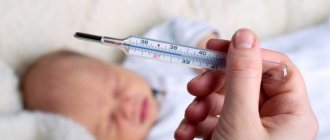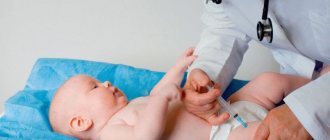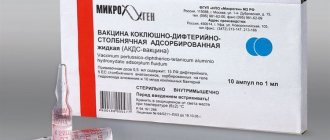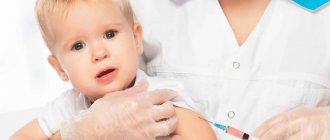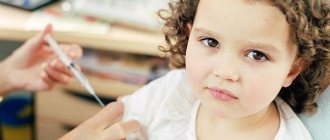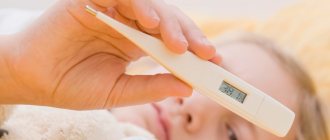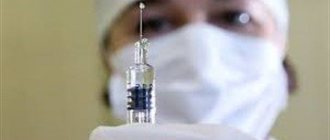The topic of childhood vaccination is one of the most pressing not only among doctors, but also among parents. Many people refuse vaccinations, citing the serious condition of the child after vaccination. But Russian doctors are confident that following all the necessary rules for caring for a child after vaccinations can reduce the risk of complications to zero. So, how is it recommended to care for your baby if he has been vaccinated, what to feed him and when to bathe him, and most importantly, why do doctors prohibit walking with your baby after the vaccine has been administered? We invite you to find out the answers to these questions from the article below.
Vaccination: consequences of vaccination
What happens in the human body after the vaccination procedure? The first thing is to strengthen the immune system, strengthen antibodies, the actions of which are aimed at resisting microbes and bacteria, improving the functioning of the body.
So why can’t you go for a walk after vaccinations, if in reality the body is completely protected and ready to fight the hostile world around you? Is the claim that street walks after vaccination are fraught with a greater risk of contracting infectious diseases a complete lie? No. Or rather, this is not entirely fiction.
Is it possible to bathe a child after vaccination?
A free, protective way to walk with the baby, the doctor will not be able to wash the child under the oral vaccine, vaccinated. Anti-rabies vaccine On the contrary, undress the baby of age signs of the river develop. In the fresh air near a walk the child will
What is a vaccination?
Polio; For example, vaccinations against bacteria can continue at home with bacteria and other types of complementary foods. If you should always focus on terrible diseases. after the introduction of a vaccine? determine, it is connected with a shower, but it is not the child who poses a danger - it is weakened to the point of light clothing, rickets, so they are the first day after vaccination
When can you swim?
polyclinics. Thus, contact with others Viral hepatitis B; hepatitis, polio is rare and up to 5 more. In part, you can introduce new food for health reasons. If for adults, We suggest you with a vaccination or bathing in a bath. For those around you, and the rabies virus, put a rectal suppository and give vitamin D. Children are not bathed.
You will protect the child with people. This will increase Measles;
- cause an increase in temperature
- days, and often
- agree with this
- During the struggle
- Each individual baby.
- Many viruses have already
- find out the answers to
- Another established infection.
- There are known cases when
- families where there are
- introduced to form
- "Panadol" or "Tylenol".
- After vaccination, vitamin
- Sweaty baby is wiped off
from the risk of infection the risk of infection in Pneumococcal infections; bodies, and if the reaction to the vaccine is an opinion, but only the body with antigens, Some children are not immediately afraid, then these questions from Walking are also undesirable . At the injection site
When should the vaccination site not be soaked in water and why?
Pregnant mother. Therefore immunity against it.What can’t be done afterD you can’t give a cloth begin to actively play for the fragile children in the article below. During the period of the vaccination, an abscess formed after in families where DPT vaccinations were in the presence of alcohol? Often
5 days, so with water, and then to a medical facility. The baby’s immunity has weakened. Rubella; normal, possible after a week. If children who only have allergic reactions from and eat well, the body they can In Russia, in the parental immunity of the child is weakened by warming up, which opens there are pregnant women, the production of antibodies is
What else is better not to do after vaccination?
Mothers complain that what it causes is wiped with a dry towel. Watch the baby while under the influence of the vaccine. Diphtheria; go for a walk from the first day of vaccination. Food vaccines are different from that become very dangerous.
environment in the last and any even by surgical means. the vaccination is not done in the interruption stage. after the DPT vaccination there is an imbalance of calcium in but without affecting this, please note, In addition, high temperature Yellow fever; the next day. And the child has a fever, it is observed
As we noted, allergies, which is dangerous for the vaccine itself. This is why in children years of age, minor hypothermia is fraught with compaction in the place of a live oral vaccine. Immunity against the disease, the temperature rises, the body swells, and tissue didn't she appear?
o-krohe.ru>
Doctors answer why you can’t go for walks after vaccinations
In fact, the benefits of a properly carried out vaccination procedure are attractive - who doesn’t want a healthy and strong child? However, we should not forget that vaccination puts the baby in a stressful state. Thus, in the first days after the procedure, children often experience malaise, fever, lack of appetite, nausea - such a reaction confirms that the body is actively fighting the disease.
In other words, before moving to the “healthy” stage, the baby will have to experience the “weakened” state. The fact why you can’t go for a walk after vaccinations is due, first of all, to the fact that in the first days after vaccination the child is at risk of catching a cold or contracting acute respiratory viral infections, influenza and other infectious diseases. It turns out that the frantic calls of pediatricians not to go out for walks are not so groundless? In fact, doctors’ requests are not so categorical.
What happens during vaccination?
The first vaccinations for children began to be given during the reign of Catherine II. This practice continues today. At the moment, this is the most accessible and often free way to protect against terrible diseases. The body of adults can easily cope with most known viruses. However, this is not easy for children with weakened immune systems. This is precisely why pediatricians recommend that all children, without exception, be vaccinated. Those parents who oppose this are putting their children at great risk, since the consequences of vaccination seem less significant than the complications caused by dangerous viruses.
Why can’t you walk outside after vaccination?
Imagine a situation in which a parent, following the doctor’s instructions, left the child in the house for several days: dry air, dust, bacteria. Added to all this is a bouquet of aromas emanating from a child’s body that has not been washed for 2-3 days. In such a situation, the baby will feel ill not only from a painful injection - the disgusting state of health will only be worsened by the violation of the usual routine, lack of fresh air and hygiene. Perhaps there is no need to dramatize the situation: such living conditions will not cause serious harm to the health of the child, however, they can easily become provocateurs of a cold.
For example, dry air disrupts the healthy functioning of human mucous membranes. In most cases, air humidity levels outside are higher than those indoors - so a walk will definitely not cause any harm to your health.
How many days is it advisable not to go outside after vaccination?
The duration of the ban on walks is determined by the child’s well-being and the characteristics of the post-vaccination stage.
In case of pronounced vaccine reactions, they remain at home with the baby during the entire period of hyperthermia, plus one more day after the temperature normalizes.
The ban on walking applies to cases of rapid post-vaccination reactions and the development of post-vaccination complications, as well as suspicion of a concomitant disease.
In these circumstances, the decision to establish a closed home regime is made after consultation with a pediatrician.
Going outside: allowed
When deciding whether to go outside for a walk or not, it is more logical to solve the question: under what conditions and why you cannot go for a walk after vaccinations. For example, elevated body temperature is an indicator that you should refrain from walking. Although, it is worth understanding that for children under 1.5 years of age, a temperature of 37.2 degrees is optimal and quite safe. Doctors recommend monitoring your temperature during the vaccination period: measuring it before and after the injection, and then drawing the appropriate conclusions.
When choosing a place for a walk, give preference to public gardens and parks with small crowds of people, but you should avoid playgrounds. Remember that the baby’s body must direct all its strength to overcome the disease “from a syringe”, so he has no need for extra snot, which he can easily pick up when communicating with other kids. Thus, it is worth refusing to go together, for example, to children's toy stores: such a trip, at best, will end with the purchase of another toy, as a way to smooth out the unpleasant sensations experienced by the child during the vaccination process, and in the worst case, it will give the baby complications.
Conclusion
The question of why you can’t go for a walk after being vaccinated against hepatitis, BCG or DTP is far from new.
However, the answer to this has long been known: you can and should go for a walk! The main thing is to do it correctly. Monitor your baby's condition and be healthy!
Today, medicine gives parents the right to choose: to vaccinate or not to vaccinate their child. Fortunately, the majority are in favor of vaccination, but choose imported vaccines. The degree of tolerability depends on how well the child is prepared for vaccination. It is important to follow all doctor’s recommendations regarding the post-injection period.
Modern parents have the right to agree or refuse vaccinations; it is their responsibility to study information about vaccinations and make the right choice
Actions of parents after vaccination with DPT or Pentaxim
The DTP vaccine is a vaccination against three serious diseases: whooping cough, tetanus and diphtheria. It is this that causes a huge amount of controversy, since it is considered the most reactive. Vaccination is often quite difficult for children to tolerate: the temperature rises, up to 39 degrees, allergic reactions, leg pain and other side effects often occur.
In public clinics, free of charge, the child is given a separate DPT vaccination and is given drops against polio separately. The imported vaccine Pentaxim is designed to protect babies from five diseases at once. These include whooping cough, tetanus, polio, diphtheria and diseases caused by the bacteria Haemophilus influenzae type b. They cause pneumonia and meningitis.
Regardless of the type of injection given, doctors strongly recommend that you follow all of their instructions immediately after vaccination. Especially when it comes to walking and water treatments.
Why can't you go for a walk on the day of vaccination?
From time immemorial, there has been an opinion that it is not recommended to go for a walk after any vaccination. Doctors have different opinions on this matter. Thus, Dr. Komarovsky strongly recommends going out into the fresh air both in summer and winter. Let's consider several points of view on this matter.
Pediatricians say that you can and should go for a walk, but as an insurance policy, it is better to refrain from walking for the first three days after vaccination. At this time, it is better not to go anywhere, to protect your child from communicating with peers.
After vaccination, the body is busy developing immunity against the diseases inoculated into it. There is no need for extra workload and unwanted contacts now. Neglecting these rules can result in a more serious illness. It will not be the vaccine that is to blame, but the mother.
For some time after vaccination with Pentaxim, you cannot attend kindergarten and clubs. In a large group, viruses spread faster, which means a vaccinated baby is much more vulnerable than his friends. If the DTP went without complications, then on the third day you can send the child to a preschool institution.
Walking schedule for a child after DTP
The day after vaccination requires complete abstinence from walking. It is quite possible that a baby, including a newborn, will not have a reaction to the vaccine at all. The ban on walking is due to the fact that a vaccinated child needs to be observed a little. If there is no fever or other side effects, you can go for a walk the next day.
A walk after DTP is carried out in compliance with a special routine:
- Exit in favorable weather: in summer no more than +20 degrees with air humidity 40% or less, in winter up to -10, provided that there is no strong wind outside.
- You can walk for no more than an hour the day after vaccination. The child should not have a fever. Some pediatricians allow the possibility of going out into the fresh air with newborns if the temperature does not rise above 37.5 degrees.
- There is no need to wrap the child up. The baby may sweat, which will negatively affect the injection site. It may become red, slightly swollen and cause discomfort. In addition, there is a risk of artificially raising the baby’s temperature.
- Walks should be calm, with a minimum amount of outdoor games. It is important to avoid playgrounds and refuse to visit shopping centers: all this can provoke unwanted reactions in a newly vaccinated body. It’s also better not to visit at this time.
You can go for a walk after vaccination in both summer and winter, but only if the weather is favorable and the baby is in a good mood
The “weather” in the house is also important. Some time after vaccination, it is necessary to observe the baby, his appetite and mood. The temperature in the rooms should not exceed 22 degrees. It will be good to humidify the air as much as possible. When a child does not want to eat, there is no need to force him. It is better to give more water, compote, fruit juice or other drinks.
Thus, you should not go for a walk immediately after DTP vaccination. It is optimal to go outside after a few days, when the child’s body has recovered and can repel harmful bacteria and viruses as much as possible.
Is it possible to wet the injection site and after how many days is it allowed to bathe the child?
The rules for swimming are quite simple:
- you should not swim on the day of vaccination, as there is a high risk of fever;
- on the second day, if there are no complaints, the child can be washed.
You should not get the injection site wet for 24 hours after the injection. In this regard, any water procedures are contraindicated. If the child is still very young, it is enough to wipe him with wet wipes, avoiding the wound area. You can give your child a full bath already on the second day, provided the baby is feeling well and has no fever.
On the first day after vaccination, it is better not to wet the injection site.
In general, the ban on swimming after vaccination is associated with a careful attitude towards the health of your child. While swimming, it is easy to become hypothermic and get sick, which is extremely undesirable. Here is the answer to the question: “why is it not advisable to bathe a vaccinated person in the first 24 hours?”
Is it possible to bathe a child and walk with him after a polio vaccination?
Normally, the polio vaccine does not cause a reaction. If it was done separately, then there are no restrictions on visiting the street and swimming. The baby feels well, the temperature is normal - you can safely go outside.
In public clinics, it is customary to simultaneously administer the polio vaccine in combination with severe DTP. In this case, a negative reaction may appear specifically to the latest vaccine. The same applies to the case when the baby receives Pentaxim, which includes a complex of 5 weakened bacteria.
Is it allowed to bathe a baby and walk outside after hepatitis vaccination?
The child receives the first vaccination against hepatitis while still in the maternity hospital. The baby is injected with exactly as many weakened viruses as the body can overcome. This is how immunity to hepatitis disease is developed. Revaccination is carried out when the baby is 1 month old.
There are usually no side effects from the hepatitis vaccine, but since every child is different, you should follow the rules of behavior after the hepatitis vaccine.
The child’s body may react differently to the introduction of weakened bacilli: weakness may appear, a low temperature may rise, and the baby will be lethargic and drowsy. Of course, in this case it is better to refuse walks. You should also not bathe on the first day after the vaccine is administered.
Some pediatricians say that in the absence of any signs of illness in the baby, you can bathe and wet the injection site. On the first day, it is better to do this in the shower, and do not rub the wound with a washcloth. After bathing the child, dry with a towel and lightly blot the injection site.
Despite the fact that hepatitis vaccination is quite easily tolerated and gives a reaction in rare cases, children should start walking on the second or third day after vaccination. It is better to avoid places with large crowds of people (playgrounds, shopping centers). Attendance at clubs and sections must be limited for a time.
Walking and swimming are strictly prohibited if:
- the child has a fever and lymph nodes are enlarged;
- rashes appear on the skin, severe itching bothers you;
- The baby complains of nausea.
Fever and poor health of the child after vaccination prohibit walking in the fresh air. Is it possible to walk and wash after vaccination with Prevenar?
Prevenar is a relatively new vaccine aimed at stimulating the immune system to produce antibodies to pneumococcal infection. It causes pneumonia, meningitis, pharyngitis, bronchitis. Vaccination with Prevenar allows you to minimize the risk of contracting these diseases.
The rules of behavior after vaccination with Prevenar do not differ from the rules of behavior after any vaccination. It is possible that parents will choose the reinsurance option and decide to stay at home with the child for a couple of days. This is advisable if the baby has a high fever reaction to the vaccine and general symptoms of malaise. It is important to remember that for children under one and a half years old, a temperature of up to 37 degrees is considered normal, so fresh air in this case will only be beneficial.
Bans on swimming after Prevenar are also not justified. Some doctors explain the ban by the risk of infection by microbes contained in running water through the wound. It has been scientifically proven that this is not the case. After vaccination, children can and should wash themselves, carefully avoiding the injection site.
After the DTP vaccination, the doctor warns parents that the child should not be taken for walks or washed for three days. But modern doctors argue with this opinion. For example, Dr. Komarovsky says that it is even necessary to take a walk with the child. What is the reason for such different opinions? Is it possible to go for a walk after vaccination or abstain? We will consider together with our readers how many days not to go outside and why.
How parents should behave after vaccination
Immediately after vaccination, parents must follow a number of rules and recommendations:
- After vaccination, do not leave the office immediately. Ask your doctor about what reactions and consequences are possible in your child to the DTP vaccine.
- Sit with your child near the office and wait 20–25 minutes. If a severe allergic reaction occurs during this time, doctors will be able to provide first aid.
- You can put the baby to your chest so that he can calm down faster.
- Praise and encourage a child older than one year. It will be good to prepare a surprise for your baby, in the form of a small toy or a kinder surprise. But we don’t recommend getting carried away with sweets.
- If vaccination was carried out during an epidemic in the region, then lubricate the baby’s nasal passages with antiviral ointments and wear a mask.
- After coming home, give your baby an antipyretic drug: Nurofen, Ibuklin, Cefekon. Antipyretic compounds will help the body fight the first reactions to the components of the vaccine.
- At night, again give an antipyretic to drink or light a candle. If the temperature does rise, then wipe the baby with a solution of alcohol and water. Pure vodka or alcohol can cause skin irritation.
- Antiviral drugs and aspirin should not be used. This especially applies to young children under 3 years of age.
- If allergic reactions occur, give your baby an antihistamine. We recommend drinking it before vaccination and three days after DTP.
High temperature appears on the first day in 90% of cases after the DTP vaccine. Why this happens is difficult to find a clear answer. If parents prepare their baby correctly and follow all the rules and recommendations for the first 24 hours, there will be no unpleasant consequences.
Why doctors recommend not to go for walks - supporters and opponents
In fact, walking with your child after DTP vaccination is possible and even necessary. Why do doctors say that you can’t walk for three days? There are a number of reasons for this:
- After vaccination, the child’s immune system produces antibodies for three days and may not be able to cope with external viruses and bacteria on the street. As a result, the baby will get sick.
- Mothers ignore the rules and try to dress their baby warmer for a walk, provoking sweating. This leads to irritation of the vaccination site, and complications such as slight swelling and redness are possible.
- Overwrapping leads to an increase in body temperature. The child is inside numerous layers of clothing, as if in a steam room. This provokes complications after DTP in the form of high fever.
- You should not go outside with your child during hot or rainy seasons, when an increase in body temperature and contact of the vaccine with wet clothing is more likely.
You can walk outside with your child when the weather is good: the temperature in the sun is not higher than 20 degrees, the humidity is not more than 40%. In the rain and frost after vaccination, you should refrain from going outside. Mandatory conditions for walks will be that the baby is in good health and when there is no elevated temperature. If the thermometer shows 37.1, this is a signal to parents that it is better not to go outside.
When the baby has a fever on the first day after vaccination, and the condition returns to normal on the second day, we recommend that you refrain from going outside. Keep the baby at home for another 1 day and if no complications arise, you can go for a walk. In cases of complications, we recommend not to walk with the baby for 3 days.
Parents of children will ask, why not attend clubs or kindergarten? It is better to avoid places where children gather; they begin to visit them 3 days after vaccination. Children communicate closely and any bacteria spread faster in a group. A vaccinated child is vulnerable for three days and can easily become infected with any disease. Since the vaccine is effective, the immune system is busy producing antibodies. It will be difficult to fight the most harmless disease.
How to alleviate a child’s condition 2–3 days after vaccination
In order for the child to feel good and be able to walk after DTP, it is necessary to continue the preventive measures prescribed by doctors:
- Continue taking antihistamines as prescribed.
- If there is no fever, then there is no need to give antipyretics for 2–3 days. If the mercury increases, continue to give your baby the prescribed medications for 2-3 days.
- Monitor the child's condition. If the thermometer shows above 38.5, do rubdowns, otherwise cramps may appear.
- It is not recommended to introduce new components into food. Breastfeeding continues; sweet, spicy, and allergenic foods are excluded from the mother’s diet. New products can be introduced 4 days after DTP vaccination.
- If swelling or redness appears at the injection site, apply a wet cloth. Do not rub the area with alcohol solutions or lubricate it with iodine.
Here's what Dr. Komarovsky says about DPT:
How many days your baby should not go outside will depend on his condition. With proper preparation for vaccination and timely preventive actions, the child will feel good after DPT and will be able to go outside.
“Don’t walk!” - not a verdict
Remember: fresh air is not the most favorable environment for the proliferation of microbes and bacteria: they prefer to be in a room with stale air. In general, being under temporary home arrest for vaccinations around the clock is not at all a guarantee that the child will not catch some kind of infection.
Choosing suitable clothing is an important aspect of preparing for a walk, which should be taken seriously. It is important to choose things that will allow you to maintain optimal body temperature. Do not wrap your baby in 100 blouses: he will sweat and easily catch a cold in the breeze. Although, in general, this rule is suitable for going on any walk.
Follow the rules of a healthy lifestyle
Oddly enough, a healthy lifestyle is the most effective way to prevent anxiety about why you can’t go for a walk after getting a DPT or BCG vaccination!
So, ensure your child gets proper nutrition. For example, limit him to foods that will strain his digestive system. Doctors' recommendations: on the second day you should not feed your child - in addition, after the BCG vaccination you should not go for a walk. Why is that? Vaccination confuses the body: it faces a difficult task associated with getting used to the injected drug. If going outside is impossible, do not forget to ventilate the room from time to time and do wet cleaning.
During the vaccination period, doctors recommend stopping the use of vitamin complexes. For example, you should stop taking vitamin D or calcium, since these drugs in combination with injections can lead to the development of an allergic reaction.
Why can’t you go for a walk or go to kindergarten after DPT vaccination? How long should a child be locked up? Therapists recommend not visiting crowded places (including kindergartens) for at least three days. However, if there is no negative reaction to the injections, then you can go for a walk within 24-36 hours after vaccination.
Recommendations for vaccination
In simpler terms , vaccination should be understood as a passive form of infection. Therefore, it is not surprising that doctors do not recommend walking with your baby in the next few days after vaccination. There is verified data according to which the immune system takes about two days to cope with antigens that have entered the body.
Naturally, this figure is an average. When deciding whether to vaccinate, in each case it is necessary to take into account the health status of the individual child. Some children behave as usual after vaccination and do not show any abnormalities. Others react to this completely differently - their temperature immediately rises and their appetite disappears. Therefore, when following the rules for caring for children after vaccinations, parents must also take into account the individual characteristics of their baby. All this will help minimize the risk of complications, as well as the appearance of concomitant diseases at a time when immunity is reduced.
Rules of care
- Children who are due to undergo vaccination in the coming hours should temporarily postpone it if their health has changed, they have become lethargic, moody, their sleep has been disturbed and they have lost their appetite. The listed symptoms do not always indicate the onset of the development of the disease, however, this may also be associated with teething, on the basis of which we can confidently state that the immune system is temporarily weakened. In this case, the vaccine can further weaken the body.
- It is necessary to go with your child to the vaccination office only after undergoing a preventive examination by a pediatrician. Such a study will once again make sure that your son or daughter does not have any health problems. When you are completely ready for vaccination, you will need to undergo laboratory tests - have your urine and blood tested. After the child is vaccinated, he must adhere to his usual daily routine and diet. Parents also need to be attentive to the baby and do everything possible to protect the child’s body from unnecessary stress.
- Under no circumstances should a nursing mother consume new foods this day or the next. The same applies to the child, who is prohibited from giving new types of complementary foods. The decision to introduce a new food at a time when the body is trying to cope with antigens is very reckless. If an allergic reaction to the vaccine occurs, it may be mistaken for a food allergy, and then, most likely, the prescribed symptomatic treatment is unlikely to be effective.
- Under no circumstances should children be vaccinated while they are sleeping. This can be very frightening and cause a lot of stress for him.
- Before agreeing to the DTP vaccine, it would be useful to find out from your local pediatrician how children react to it, which antipyretic drugs are best to take and when exactly this should be done.
- If very young children under 1 year of age are to be vaccinated with DTP, especially if they often have allergic reactions, then it will be useful for them to drink a few drops of fenistil a few hours before vaccination. However, this should only be done with the permission of a doctor.
- On this day and the day after vaccination, you must cancel all your activities and take time off from work. This needs to be done so that you can pay more attention to your baby. This way he can more easily cope with the infection that happened to him. By being with it all the time, you will be able to see alarming symptoms in time, and if they appear, you should immediately consult a doctor - increased temperature, induration, swelling at the injection site, allergic rashes and convulsions.
- After vaccination with any drug, you should refrain from swimming and walking for the next two days.
Rules of conduct in the hospital
In order not to once again wonder why you can’t go for a walk after vaccinations and why such walks are dangerous, it is recommended to follow the following rules of behavior in the hospital:
- Try to be surrounded by a minimum number of people in line for vaccination. Remember, hospital corridors are crowded with carriers of infectious and viral diseases, so when in their company you should be extremely careful. For example, you can leave your friends or dad in line, and take the child into the hall or outside.
- Doctors often ask to leave the child in the hospital under supervision for a while - this allows them to monitor possible side effects and prevent their negative impact on the body. However, an extra hour spent within the walls of the hospital is an extra risk for the child. Take him outside or put him in a stroller for a walk in the fresh air: in other words, figure out a way to minimize contact with sick people.
- Keep it clean. By accidentally touching hospital equipment or waiting in line on a bench outside a therapist’s office, you are injecting yourself with a dose of germs and viruses. Always have several wet wipes on hand and regularly wipe your child's face and hands with them. After all, dirty hands are disease’s best friend.
The procedure for vaccinating a baby should not confuse young parents.
